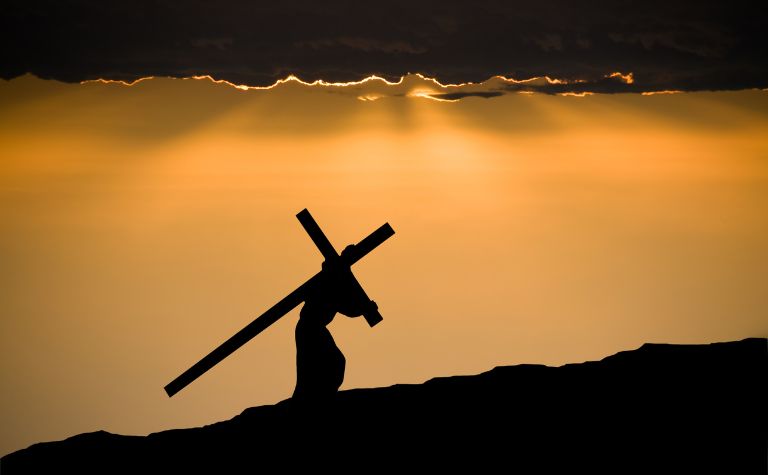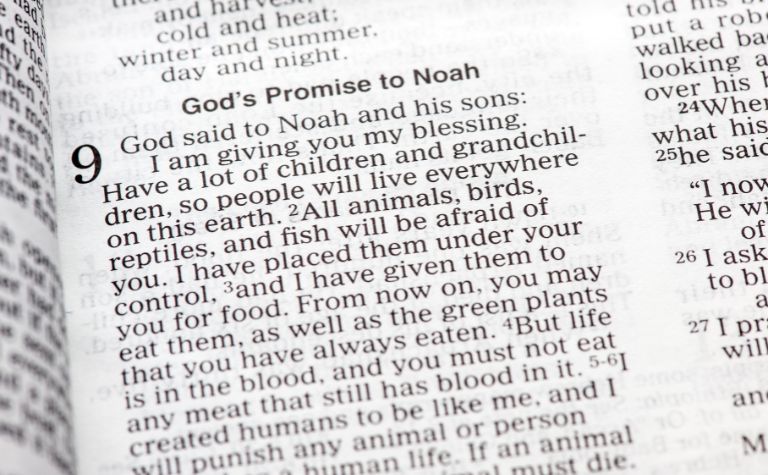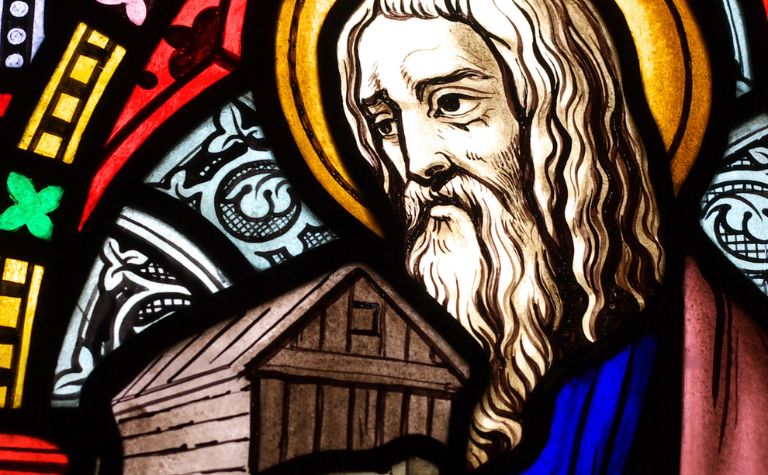The Bible calls Noah a righteous and blameless man (Gen. 6:9). Many people know him because he, along with his family, survived the flood that God sent to the world as a punishment for sin (Gen. 6-9). After the flood, Noah’s sons and wives began repopulating the earth. This story leads many people to which son of Noah is in Jesus’ lineage.
Jesus Christ was in the line of Noah’s son, Shem, according to the Gospel of Luke, which traces his lineage to Adam. Shem was Noah’s firstborn son. His younger brothers were Ham and Japheth. Shem fathered the Semitic people, including Abraham and the Israelites, and carried God’s blessing.
Where does Luke mention that Shem is in Jesus’ line? Why doesn’t Matthew list him in his genealogy of Jesus? What Old Testament book does Luke likely use as a source for the names he lists from Noah’s generation? What role does Shem have in Noah’s biography, especially in the flood story? Keep reading to learn the answers to these questions and others.
Also, see Where is Noah’s Ark? to learn more.

Shem In Jesus’ Genealogy
Unlike the Gospel of Matthew, which starts with Jesus’ genealogy, Luke places it after Jesus’ birth narrative and his introduction to John the Baptist (Luke 3:23-38). This arrangement was strategic on Luke’s part as it appears before the narrative of Jesus’ public ministry, which unfolds in the rest of the Gospel.
To understand its importance, readers can compare Luke’s genealogy with Matthew’s. For instance, unlike Matthew’s list, which starts with Abraham and ends with Jesus, Luke starts with Jesus and ends with Adam.
Matthew wanted to show his readers Jesus’ connection to Abraham, the father of the Jewish people. However, his genealogy doesn’t go back far enough to include Noah and his sons, who lived generations before Abraham.
Yet, Luke’s list had a different purpose for including Abraham’s ancestors. The reason he goes all the way back to Adam is to show that Jesus is more than the Savior of the Jews, even though that is his ancestry. Instead, he is the Savior of all people, Gentiles included (cf. John 3:16; Rev. 7:9).
Moses and Luke Trace Jesus’ Family Line
The list of names in Genesis 5 connects Adam’s narrative (Gen. 1-4) to Noah’s (Gen. 6-9). Some scholars think Genesis might be Luke’s source for the parallel section in his genealogy of Jesus (Luke 3:36-38).
| Genesis 5 | Luke 3 |
|---|---|
| Adam (v. 1-5) | Adam (v. 38) |
| Seth (v. 6-8) | Seth (v. 38) |
| Enosh (v. 9-11) | Enos (v. 38) |
| Kenan (v. 12-14) | Cainan (v. 37) |
| Mahalalel (v. 15-17) | Mahalaleel (v. 37) |
| Jared (v. 18-20) | Jared (v. 37) |
| Enoch (v. 21-24) | Enoch (v. 37) |
| Methuselah (v. 25-27) | Methuselah (v. 37) |
| Lamech (v. 28-31) | Lamech (v. 36) |
| Noah (v. 32) | Noah (v. 36) |
| Shem, Ham, Japheth (v. 32) | Shem (v. 36) |
Luke mentions Shem but not Ham or Japheth: “…the son of Shem, the son of Noah, the son of Lamech…” (Luke 3:36). Luke scholar Darrell Bock believes the source is clear: “This name is derived from the individual in Gen. 5:32, though the name also appears in Gen. 9:26-27.” [1] In Genesis 9:26-27, God blesses Shem and his descendants.
Also, see How Old Was Noah When He Built the Ark? to learn more.

Shem, Ham, and Japheth in Noah’s Story
Noah’s sons are an essential part of his biography in Genesis. They are mentioned in critical parts of his story, especially in the flood narrative, because they and their wives begin to repopulate the earth.
| Flood Story | Genesis |
|---|---|
| Noah’s biography starts | “After Noah was 500 years old, Noah fathered Shem, Ham, and Japheth.” (5:32) |
| The flood story starts | “And Noah had three sons, Shem, Ham, and Japheth.” (6:10) |
| The family enters the ark | “Noah and his sons, Shem and Ham and Japheth, and Noah’s wife and the three wives of his sons with them entered the ark” (7:13). |
| The family exits the ark | “The sons of Noah who went forth from the ark were Shem, Ham, and Japheth. (Ham was the father of Canaan.)” (9:18) |
| Noah’s sons have children | “These three were the sons of Noah, and from these the people of the whole earth were dispersed.” (9:19) |
After the flood story, disaster strikes Noah’s family. After planting a vineyard, Noah got drunk. Ham responded to his father’s sin by sinning himself.
The description reads, “And Ham, the father of Canaan, saw the nakedness of his father and told his two brothers outside” (Gen. 9:22). Scholars debate whether the description “saw” refers to merely a visual observation or if it implies sinful behavior.
Shem and Japheth carefully covered up their father’s nakedness, but the damage was already done (Gen. 9:23). When Noah woke up, he cursed Ham and his son Cannan before blessing Shem and Japheth (Gen. 9:24:27).
Ham was the father of the Cushites, Egyptians, and Canaanites (Gen. 10:6). Japheth was the father of Gomer, Magog, Madai, Javan, Tubal, Meshech, and Tiras (Gen. 10:2). Shem’s line carried God’s promise and eventually his covenant, which he gave to Abraham (Gen. 12:1-3).
Also, see How Many Animals Could Fit on Noah’s Ark? to learn more.

From Shem to Abraham
Like the list of names in Genesis 5 connects Adam to Noah, the one in Genesis 11 connects Shem to Abraham. The passage begins, “These are the generations of Shem” (Gen. 11:1).
The list doesn’t include the descendants of Ham and Japheth because the narrative in Genesis, chapters 12-50, is focused on tracing God’s blessing and his covenant of blessing.
| Genesis 11 | Luke 3 |
|---|---|
| Shem (v. 10-11) | Shem (v. 36) |
| Arpachshad (v. 12-13) | Arphaxad (v. 36) |
| Shelah (v. 14-15) | Shelah (v. 35) |
| Eber (v. 16-17) | Eber (v. 35) |
| Peleg (v. 18-19) | Peleg (v. 35) |
| Reu (v. 20-21) | Reu (v. 35) |
| Serug (v. 22-23) | Serug (v. 35) |
| Nahor (v. 24-25) | Nahor (v. 34) |
| Terah (v. 26) | Terah (v. 34) |
| Abram, Nahor, and Haran (v. 27) | Abraham (v. 34) |
Other Recognizable Names in Jesus’ Genealogy
Luke’s genealogy is the only place some names are found in the Bible. However, there are also well-known Old Testament figures on the list, too.
- Jacob (v. 34)
- Isaac (v. 34)
- Judah (v. 33)
- Boaz (v. 32)
- David (v. 31)
- Joseph (v. 23)
Also, see How Big Was Noah’s Ark? to learn more.
References:
[1] Luke 1:1-9:50 by Darrell Bock. BECNT. p. 359.
[2] Holman Illustrated Bible Dictionary
Related Questions
Noah is an iconic figure in the Bible who is known for his righteousness and faith. After God decided to destroy the world with a flood because of how sinful humanity had become, he called Noah to...
The story of Noah, the flood, and the ark is one of the most iconic narratives in the Bible. Not only does the magnitude of the floodwaters leave readers awe-struck, but so does the faith that Noah...
